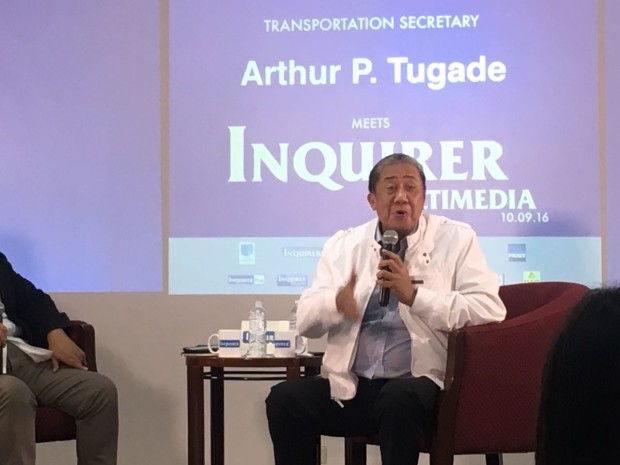Tugade hopes Duterte gets special powers before year ends

Transportation Secretary Arthur Tugade at Meet Inquirer Multimedia forum. YUJI VINCENT GONZALES/INQUIRER.net
Transportation Secretary Arthur Tugade is hoping that Congress will grant President Duterte emergency powers before the year ends so the administration can expedite the completion of projects that would help solve the debilitating traffic crisis in Metro Manila and other major urban areas.
At the Meet Inquirer Multimedia forum on Wednesday, Tugade said he believed that the Senate and the House of Representatives were “willing and open” to give the administration a chance to solve the transportation woes through the emergency powers, since the projects could also address other traffic-related problems like the high cost of food.
He nevertheless maintained that even without such powers the administration would still pursue infrastructure projects worth P8 trillion for the transport sector over the next five years, although these may be completed a bit slower.
Tugade’s visit to the Inquirer came amid mounting criticism as some had expected that traffic-busting solutions would arrive sooner than later, and as the Department of Transportation (DOTr) struggled to secure special powers from lawmakers.
At least one activist group had publicly opposed Tugade’s confirmation as transportation secretary. But he brushed the issue aside, branding it a “distraction.”
Article continues after this advertisementTugade said patience and cooperation were needed from the public.
Article continues after this advertisement“I intend to make a difference,” he said. “That difference will be given with all my effort and industry along the lines of no corruption and good governance as elucidated by President Duterte.”
“We will not move slow,” said Tugade, the 71-year-old former head of Clark Development Corp. who previously met business success in the logistics sector. “We’re moving quite fast.”
He acknowledged certain limitations when implementing government projects without special powers, especially in the areas of right-of-way and potential legal opposition.
The time frame to make this “dent” was still within five years, he said, though delays could crop up with special powers.
Solving traffic woes around Metro Manila was also challenging given the varying rules between the national government and local government units (LGUs).
The multiyear target to cut road congestion also comes as many of the government’s plans included big-ticket infrastructure projects—such as expressways and train projects—which can take years to complete.
Among the key projects the DOTr is looking at is the expansion of the country’s rail system, which is currently only at 70 kilometers. Kenya has at least 1,000 kilometers of railways, Tugade noted.
“Railroad is one of the most efficient public mass transport [systems],” he said. “The price of our goods is rising because of the lack of mobility and connectivity. Even our livelihood is affected.”
Hence, he said, the administration had put a “high-priority” tag on the development of the 2,000-km Mindanao Railway, the first phase of which would involve the completion of the system’s first 200-km route.
Once completed, Tugade said this would allow commuters to reach Surigao and Cagayan de Oro from Davao in just two hours. Food and other products also could be delivered at a faster and much cheaper rate, he said.
Manila-Clark Railway
To further make use of Clark International Airport and ease congestion at Ninoy Aquino International Airport, the Manila-Clark Railway will be developed.
Tugade said this line would bring commuters from Metro Manila to the Pampanga airport in just an hour.
The secretary said that alongside the development of the Manila-Clark Railway was the construction of the Subic-Clark Cargo Railway. Once this is developed, the government can “establish the fundamentals of a logistics chain hub concept.”
Through the railways, Tugade said the South and North Harbors would be decongested, thus easing traffic in Manila.